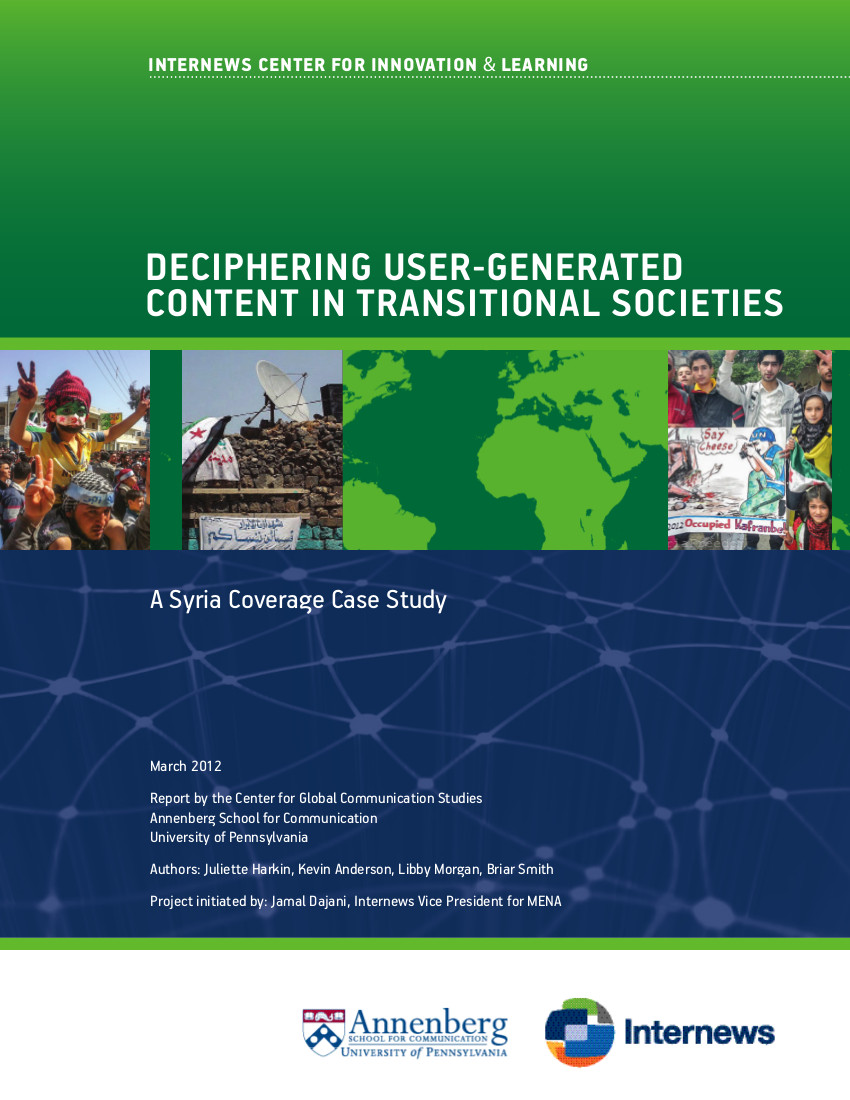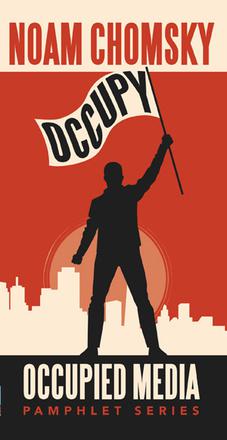Deciphering User-Generated Content in Transitional Societies: A Syria Coverage Case Study (2012)
Filed under report | Tags: · activism, journalism, mass media, social media, syria

“Social media and user-generated content played an important role in coverage of the revolutions in Egypt, Tunisia and Libya; however, content from the public was supplementary to traditional newsgathering in media coverage.
By contrast, in Syria, with the tight control and exclusion of foreign media, news organizations had to rely almost exclusively on user-generated content, particularly in the early months of the uprising. Much of the user-generated content used by news outlets came via Syrian activists inside Syria and in exile.
To examine how user-generated content has been integrated into prominent Arab-language news organizations, Internews commissioned and collaborated with the Center for Global Communication Studies to produce Deciphering User-Generated Content In Transitional Societies: A Syria Coverage Case Study which looks closely at how BBC Arabic and Al Jazeera Arabic used social media, photos and videos taken by members of the public to provide coverage of the uprising in Syria, particularly in the early days of the uprising.
Based on research conducted over a 12-week period between November 2011 and January 2012, this study employed a qualitative, mixed method approach using literature review, in-depth interviews with 19 media practitioners, academics, activists and commentators; and, a content analysis of the news and current affairs output of BBC Arabic and Al Jazeera Arabic, focusing on three major events at different stages of the Syrian revolt.”
March 2012
Report by the Center for Global Communication Studies, Annenberg School for Communication, University of Pennsylvania, commissioned by Internews
Authors: Juliette Harkin, Kevin Anderson, Libby Morgan, Briar Smith
40 pages
Peter Drahos, John Braithwaite: Information Feudalism: Who Owns the Knowledge Economy? (2002)
Filed under book | Tags: · activism, business, copyright, economics, intellectual property, knowledge economy, law, piracy, politics, TRIPS, wto

New intellectual property regimes are entrenching new inequalities. Access to information is fundamental to the exercise of human rights and marketplace competition, but patents are being used to lock up vital educational, software, genetic and other information, creating a global property order dominated by a multinational elite. How did intellectual property rules become part of the World Trade Organization’s free trade agreements? How have these rules changed the knowledge game for international business? What are the consequences for the ownership of biotechnology and digital technology, and for all those who have to pay for what was once shared information? Based on extensive interviews with key players, this book tells the story of these profound transformations in information ownership. The authors argue that in the globalized information society, the rich have found new ways to rob the poor, and shows how intellectual property rights can be more democratically defined.
Publisher Earthscan, 2002
ISBN 1853839175, 9781853839177
253 pages
PDF (updated on 2012-6-13)
Comment (0)Noam Chomsky: Occupy (2012)
Filed under pamphlet | Tags: · activism, money, occupy movement, politics, protest

“Since its sudden appearance in September 2011, the Occupy movement has spread to thousands of towns and cities across the world. For some it’s the economy. For others, it’s something deeper. Through relentless organizing and ongoing civil disobedience, the movement now occupies the global conscience as its influence spreads from street assemblies and protests to op-ed pages and the corridors of power. From the movement’s onset, Noam Chomsky was there, offering his voice, his support, and his detailed analysis of what’s been going down and what might be done.
In Occupy, Chomsky presents his latest thinking on the core issues, questions and demands that are driving ordinary people to protest. How did we get to this point? How do the wealthiest 1% influence society? How can we separate money from politics? What would a genuine democracy look like? How can we create new institutions to increase freedom and equality for all? Following the old course, says Chomsky, isn’t going to work. If we continue to follow the model of growth set for us by the 1%, we’ll be “like lemmings walking off a cliff.” The only alternative is to get involved and fight for a better future. If not now, when? If not us, who?
Occupy also features graphics by R. Black, photography by Alex Fradkin and Stanley Rogouski, and a “What To Do If You Get Arrested” guide for protestors written by The National Lawyers Guild. Read this book if you want to do something to fight back against corporate influence and government control.”
Publisher Zuccotti Park Press, Brooklyn, New York, 2012
Occupied Media Pamphlet series
ISBN 9781884519017
128 pages
PDF (added on 2017-12-2)
MOBI (updated on 2017-12-2)

